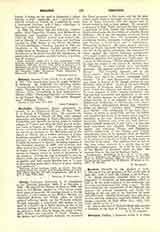

Beschi, COSTANZO GIUSEPPE, b. at Castiglione in the Venetian Republic, 1680; d. at Manapar c. 1746. He entered the Society of Jesus in 1698, and went to the Madura mission in 1710, during nearly forty years of apostolic life proving himself a worthy successor of the founder of the Madura Mission, the celebrated Roberto de’ Nobili. Once he barely escaped suffering death for the Christian religion. Though primarily a missionary and always at the head of a district, he is better known as one of the classical writers of Tamil literature. No sooner had he arrived in India than he began the study of Sanskrit, Telugu, and especially of Tamil. Thanks to his genius and indefatigable industry, he mastered the Tamil grammar in five years, and for the next twenty years made so thorough a study of the whole field of Tamil literature that the native men of letters bowed to him as their master. He composed a grammar of High Tamil, and was the first to write a grammar of Low Tamil (the common dialect) which still remains the foundation of scientific Tamil philology. He is also the compiler of several Tamil dictionaries, among them the quadruple lexicon containing words, synonyms, categories of words and rhymes; a Tamil-Latin and a Tamil-Latin-Portuguese dictionary. He wrote several ascetical books in Tamil, especially doctrinal instructions for the use of the native catechists; also controversial tracts against the Danish Lutheran missionaries who sought to gain a foothold in the Madura Mission. Beschi is, however, best known as a Tamil poet. In a poem of 1100 stanzas, “Kitteri ammalle saritiram”, he sings the praises of the martyr St. Quiteria (not St. Catherine, as some writers have mistakenly asserted). His greatest poetical work is the “Ternbavani” (The Unfading Garland), one of the Tamil classics. This Tamil “Divina Commedia” is divided into thirty-six cantos, containing 3,615 stanzas. “It is”, says Baumgartner, “the noblest epic poem in honor of St. Joseph written in any literature, East or West. In one of the most difficult languages of Southern India Beschi produced a poem which for richness and beauty of language, for easy elegance of metre, popular treatment, and true poetical conception and execution, is the peer of the native classics; in nobility of thought and subject-matter, it is as superior to them as the harmonious civilization of Christianity rises above the confused philosophical dreams and ridiculous fables of idolatry.” Another poem “Paramartaguru Kadey” (the adventures of the Guru Paramarta), in which he delightfully satirizes the foibles and conceited ignorance of the native gurus (heathen teachers), is the most entertaining book in Tamil literature, bubbling over with wit and humor. Beschi himself translated it into Latin. It has also been translated into English, French, German, Italian, and Canarese. Grasse and Babington, editors respectively of the German and English translations, seem to be ignorant both of Beschi’s authorship of the book and of his great importance in the literature of Southern India, for they make no mention of his name. The tradition that he was at one time prime minister to a native raja is not sufficiently authenticated. In 1744 he was rector of the Mission of Manapar, where he died. His memory lives to this day in Southern India.
B. GULDNER

